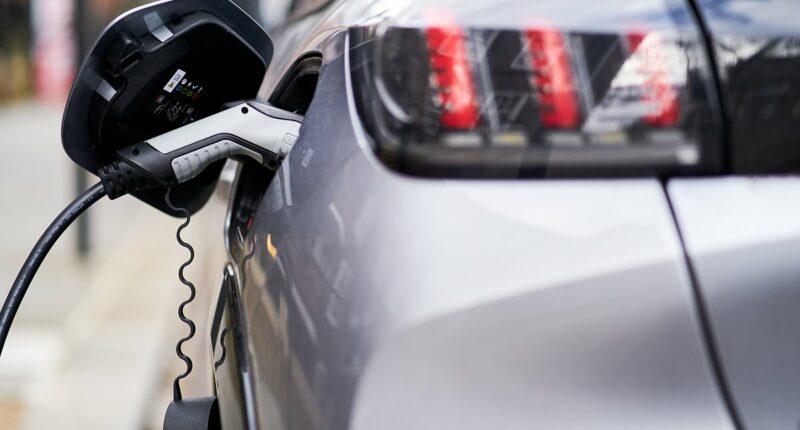Share this @internewscast.com
Rachel Reeves is facing criticism over potential plans to introduce ‘road pricing’ for electric vehicle (EV) drivers, which would mark another shift in her policy commitments.
The Chancellor is reportedly considering implementing a levy of 3 pence per mile for EVs, in addition to existing road taxes, as part of an effort to address a significant deficit in public finances.
This proposed tax could mean drivers would pay between £250 and £300 annually by 2028, based on typical usage patterns. Hybrid vehicles would also be subject to a new charge, albeit at a lower rate.
The Treasury is likely to argue that the new tax is essential to compensate for the decline in fuel duty revenue as more drivers switch to environmentally friendly vehicles.
Nonetheless, the Conservative Party has highlighted that Reeves had previously dismissed the idea of road pricing following her last budget, which included several tax increases. Motoring organizations have also expressed concerns, describing the plan as potentially being a ‘poll tax on wheels’ for the Labour Party.
It is estimated that up to six million additional electric vehicles could be on the roads by the time this proposed scheme is implemented.

Rachel Reeves is poised to break another promise amid claims the Budget will bring in ‘road pricing’ for electric car drivers

Rachel Reeves is expected to announce that EV’s will be charged 3p per mile on top of other road taxes. Meanwhile, hybrid cars will also face a new, but lower, charge
Ms Reeves could also argue the move will be fairer as petrol drivers already pay £600 a year on average in fuel duty.
It would help the Treasury raise an estimated £1.8billion by 2031 and help plug a fiscal hole caused by the green transition due to the loss of revenue from petrol cars.
A pay-per-mile road taxation system has been discussed by governments and industry experts for years.
However, up to now it has been regarded as too politically toxic.
Ms Reeves was asked by Tory MP Harriett Baldwin at a Treasury Select Committee hearing last November whether she was ‘planning, during this Parliament, to move beyond fuel duty and to introduce a system of road pricing?’
She replied: ‘We are not looking at road pricing.’
AA president Edmund King said: ‘Whilst we acknowledge the Treasury is losing fuel duty revenue as drivers go electric, the Government has to tread carefully unless their actions slow down the transition to EVs.
‘The Zev mandate for 28 per cent of new car sales to be zero emissions this year will not be met as sales are running at just 22 per cent.
‘We need to see the detail of this proposal to ascertain whether these new taxes will be equitable or a poll tax on wheels.’
The so-called poll tax – introduced by Margaret Thatcher’s government in Scotland in 1989 and then England and Wales the following year – was a fixed payment for all adults, which sparked violent protests.
The Daily Telegraph suggested Ms Reeves’s EV scheme will involve users estimating how far they will drive over the following 12 months, and making an extra payment on top of vehicle excise duty (VED).
If they drive more they will need to top up this amount, while some of the money would carry over to the next year if someone clocks up fewer miles.
Journey examples of a 3p per mile fee include £12 between London and Edinburgh, £5 between Cambridge and Bristol, and £2 between Liverpool and Leeds.
The exemption for EVs from VED was removed in April.
Ginny Buckley, chief executive of EV advice site Electrifying.com, said: ‘This is yet another example of mixed messaging from the Government.
‘Drivers are being encouraged to go electric, then hit with the threat of new taxes – you can’t drive the EV transition with one foot on the accelerator and the other on the brake.
‘This adds extra cost for EV drivers who can’t charge at home and already pay more per mile on public chargers than many petrol drivers.
‘It also penalises those who switched in good faith, based on promised savings.’

















